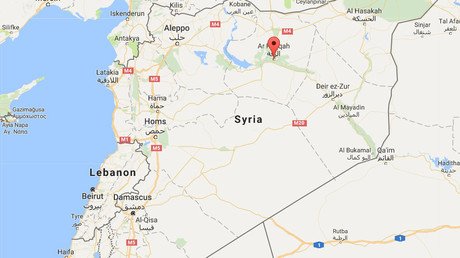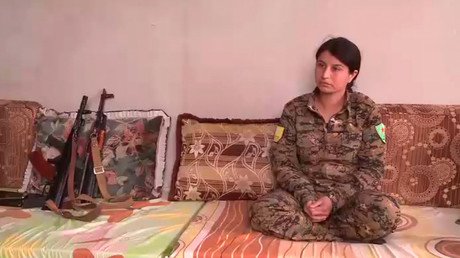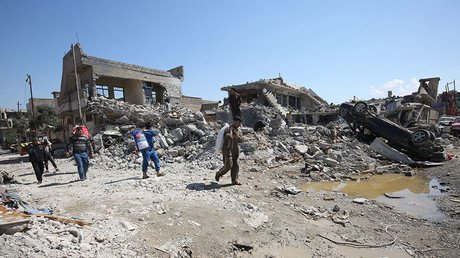US-led coalition airstrike mistakenly killed 18 SDF ally fighters in Syria on April 11 – Pentagon
The US-led coalition fighting Islamic State in Syria mistakenly killed at least 18 Syrian Democratic Forces (SDF) fighters in an airstrike on April 11, the United States Central Command (CENTCOM) said in a statement.
“A Coalition air strike in support of partnered forces fighting ISIS south of Tabqah, Syria, resulted in 18 Syrian Democratic Forces personnel killed April 11,” the statement said.
BREAKING: Coalition says its own aircraft accidentally killed 18 SDF allies near Tabqah on April 11th [4th admitted 'friendly fire' event] pic.twitter.com/jxoELTEnhK
— Airwars (@airwars) April 13, 2017
It went on to say that the strike was “requested by the partnered forces,” who identified the target location as “an ISIS fighting position.” “The target location was actually a forward Syrian Democratic Forces fighting position,” CENTCOM added.
The statement then said that the Coalition expresses “deepest condolences” to the members of the SDF and their families and will implement appropriate safeguards to prevent similar incidents in the future.
Tabqah, near to where the incident occurred, is a town in Raqqa province, located some 55km from the city of Raqqa, which is considered to be the self-declared capital of IS terrorists in Syria.
This area, which has strategic importance due to a dam located nearby, is witnessing heavy fighting between Islamic State extremists and the SDF units supported by the US-led coalition.
The SDF is a multi-ethnic alliance consisting of Kurdish and Arab fighters which was formed in October 2015 and is backed by Washington.Kurdish militias are believed to play a dominant role in the group.
Operation Inherent Resolve, launched by the US in summer 2014 to fight Islamic State in Syria and Iraq, calls the group one of the “vetted forces” in Syria. US forces are also actively cooperating with the SDF on the ground.
In late March, the Pentagon confirmed that US air assets were used to airlift Syrian militia fighters in a bid to take the strategic Tabqah Dam while US forces also provided support to SDF fighters.
An RT crew working in the Tabqah area spotted US troops, who were deployed to Syria to “train, advise and assist,” just miles away from the Raqqa frontline, fighting alongside SDF units.
The April 11 friendly fire incident was not the first in the history of the US military campaign in Syria. In June 2016, the Pentagon confirmed that the US had conducted a series of airstrikes in and around the city of Ma’ra in May, one of which killed four fighters from an allied Sunni Muslim militant group, the Mutasim Brigade, which Washington had trained.
That incident was reportedly the first friendly fire incident acknowledged by the Pentagon in Syria during its anti-IS operation. In November 2016, the US-led coalition also mistakenly hit the positions of the Syrian government forces in Deir ez-Zor, killing 62 soldiers and injuring 100 others. CENTCOM called the strike an “unintentional, regrettable error,” which was "primarily based on human factors.”
The actions of the coalition also repeatedly led to casualties among civilians. According to the Coalition’s December report, 54 civilians were “inadvertently killed” in seven strikes between March and October 2016.
In March, following the latest round of investigations into Coalition airstrikes, the US Central Command said that warplanes had killed 21 civilians in nine separate strikes in Iraq and Syria, which brings the officially acknowledged civilian death toll from US-led Coalition strikes to 220 since 2014.
Earlier in April, reports emerged in Syrian media saying that at least 15 civilians, including three children and a woman, had been killed in a village near the city of Raqqa, in an alleged airstrike by the US-led coalition.
In October 2016, a report by Amnesty International said that 11 Coalition attacks “examined by the organization appear to have killed some 300 civilians during two years of strikes targeting the armed group calling itself Islamic State (IS).”
“It’s high time the US authorities came clean about the full extent of the civilian damage caused by Coalition attacks in Syria,” Lynn Maalouf, deputy director for research at Amnesty International's Beirut regional office, said.
Such friendly fire accidents are inevitable in proxy wars, similar to the one the US is waging in Syria against Islamic State, Martin Jay, journalist and Middle East expert, told RT, commenting on the incident. At the same time, he stressed that the US must conduct an investigation to ensure its allies remain onside.
There should be an investigation if the US “wants to keep good relations with its allies in the region, not only Kurds. It could be others when these friendly fire incidents happen … so the US-coalition forces should show some solidarity,” he said, adding that similar incidents have already happened in Iraq and involved “the US and British forces killing Iraqi soldiers on the ground.”
He also stressed that “Kurds and their allies from the SDF are doing a lot of fighting in northern Syria against ISIS and they are quite important allies for [US President Donald] Trump to have,” adding that breaking this relationship “would be a cataclysmic error on his part.”
Although Washington largely depends on Kurdish forces on the ground in Syria, journalist and author Adel Darwish questions if “someone” within the US-led coalition actually acts against them, noting that the Kurds have often been “betrayed” in the past.
“It makes one wonder about the accuracy of the information that the United States-led coalition is getting and whether actually someone within this coalition, deliberately, do not like the Kurds or do not want the Kurdish Democratic Forces to advance,“ Darwish told RT. “Or even perhaps suspiciously wants to delay the defeat of ISIS."















